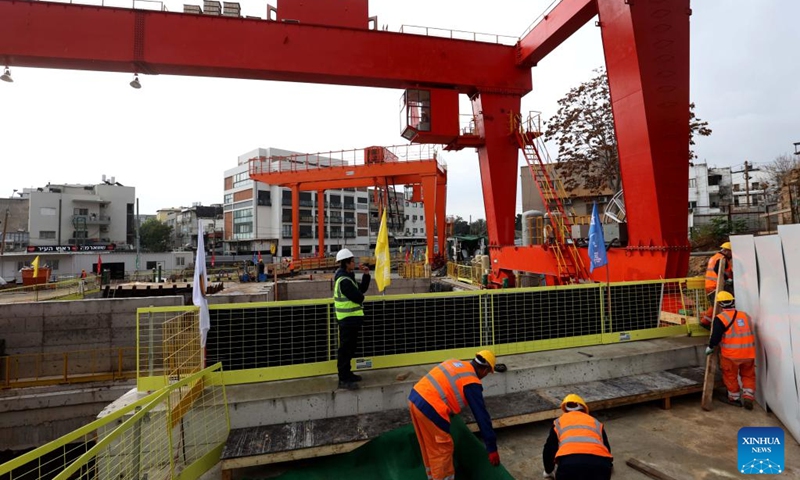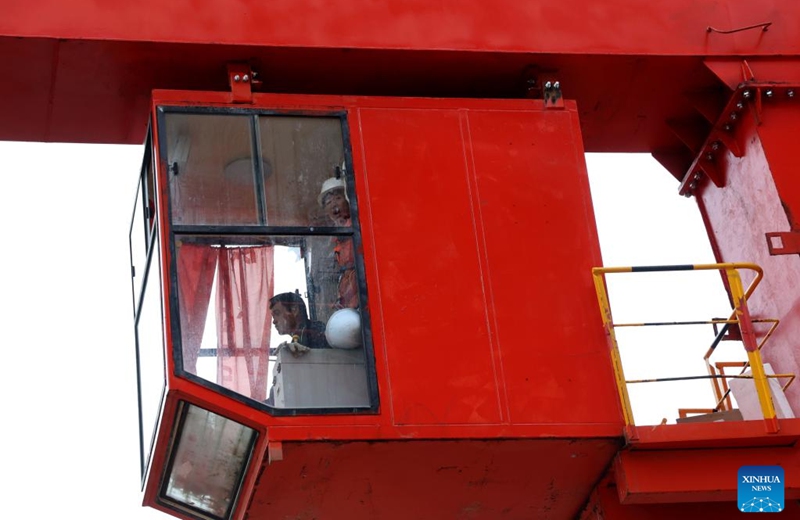
Construction workers work at the G3-2 section of Tel Aviv's light rail Green Line in Tel Aviv, Israel, Dec. 25, 2022. The first tunnel boring machine of Tel Aviv's light rail Green Line G3-2 section kicked off its tunneling on Sunday, marking a milestone stage of the Chinese-constructed project aiming to ease traffic congestion in the Israeli metropolis. Photo: Xinhua
The first tunnel boring machine of Tel Aviv's light rail Green Line G3-2 section kicked off its tunneling on Sunday, marking a milestone stage of the Chinese-constructed project aiming to ease traffic congestion in the Israeli metropolis.
The project, undertaken by China State Construction Engineering Corporation (CSCEC), is expected to complete in 2025 with a 5.7 kilometer-long double-lane tunnel, two access sections, one underground station as well as three underground structures.
Lou Yusai, general manager of CSCEC Israel, said the tunnel project is constructed with three earth pressure balance machines made in China. The total length of the giant equipment is 115 meters, with an excavation diameter of 7.54 meters.
Li Jiqin, executive general manager of CSCEC International, a subsidiary of CSCEC Group in international business, said the project is CSCEC's another entry into subway construction in developed countries after the United States and Singapore.
Over the past three years, the team, consisting of Chinese and local constructors, has conquered a series of challenges in the city center in terms of traffic diversion and pipeline relocation by adopting Chinese technology and equipment, Li said.
Haim Glik, CEO of the NTA-Metropolitan Mass Transit System, said Tel Aviv has been facing traffic congestion for a long time, and the completion of the Green Line is expected to greatly reduce the traffic pressure for commuters.
Working on the G3-2 section, an important part of the overall construction of the Green Line, the Chinese company has tackled complex problems in a complex location, and made contributions to the expected alleviation of the traffic pressure in the populated Israeli city, Glik added.
The Tel Aviv Light Rail Project is the largest government-chartered infrastructure project since the founding of Israel, in which the Green Line will connect the center of Tel Aviv with the northern and southern regions.
After completion, the 39-km-Green Line will run from Rishon LeZion, an Israeli city south of Tel Aviv, northwards through Holon, then through central Tel Aviv before splitting into two northbound branches.

Construction workers work at the G3-2 section of Tel Aviv's light rail Green Line in Tel Aviv, Israel, Dec. 25, 2022. The first tunnel boring machine of Tel Aviv's light rail Green Line G3-2 section kicked off its tunneling on Sunday, marking a milestone stage of the Chinese-constructed project aiming to ease traffic congestion in the Israeli metropolis. Photo: Xinhua
